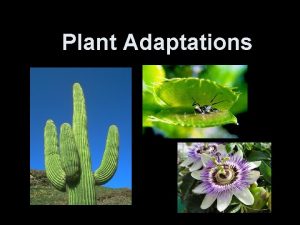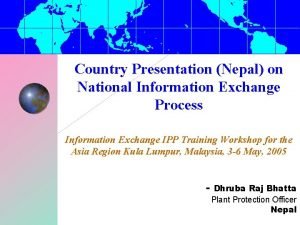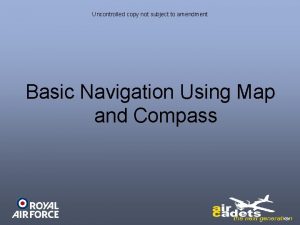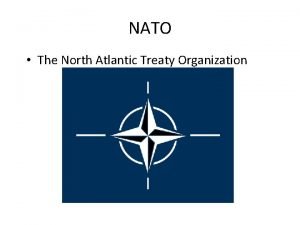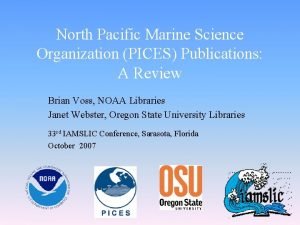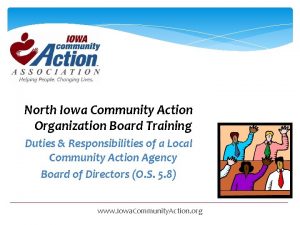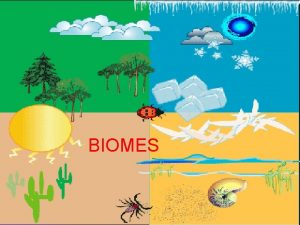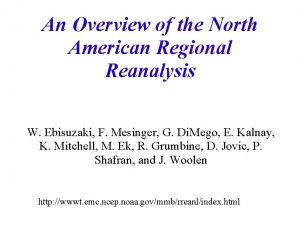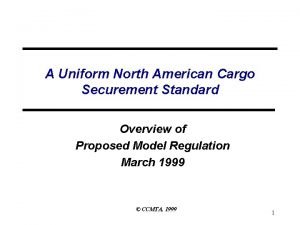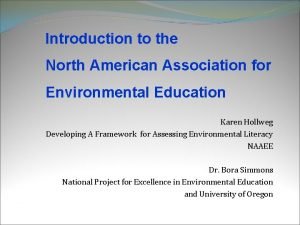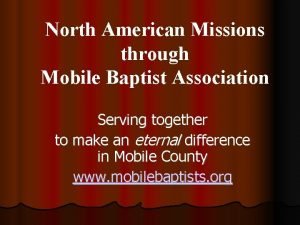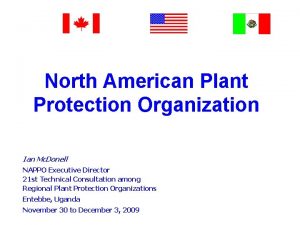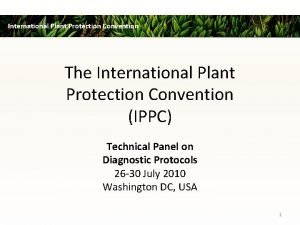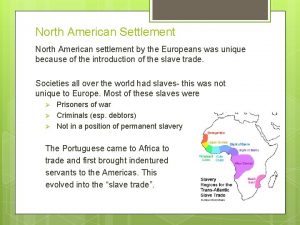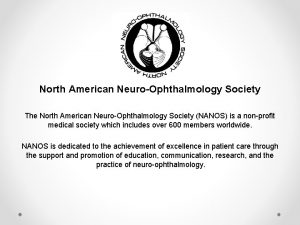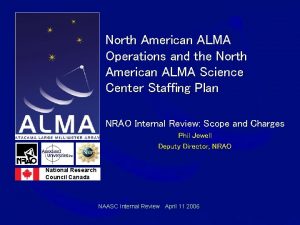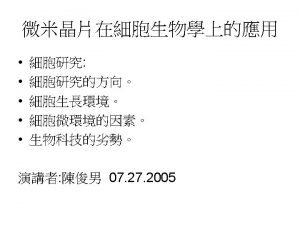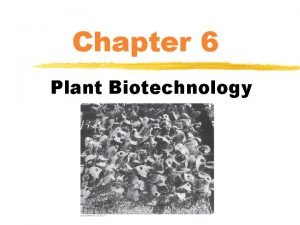North American Plant Protection Organization Ian Mc Donell


















- Slides: 18

North American Plant Protection Organization Ian Mc. Donell NAPPO Executive Director 20 th Technical Consultation Among Regional Plant Protection Organizations Rome, Italy August 25 -28, 2008

Success/Challenges Independent Evaluation of NAPPO 2007

Terms of Reference ØNAPPO’s mission and strategic goals ØPerformance and Effectiveness of NAPPO ØGovernance and Organizational Structure ØNAPPO funding

RE: NAPPO’s mission and strategic goals ü There is very strong public and private support – regionally and internationally; üNAPPO is widely recognized for its leadership within the region and globally.

RE: Performance and Effectiveness of NAPPO v. Numerous regional standards have been the basis for international standards of the IPPC v. These ‘success stories’ underscore the benefit, measured in terms of economic losses avoided in the millions of dollars.

RE: Governance and Organizational Structure q. The organizational structure of NAPPO is judged to work quiet well. q. NAPPO’s Strategic Plan should be updated taking into account this evaluation and monitored/updated on an annual basis

RE: NAPPO funding §NAPPO has a very small budget for an international organization, especially considering its major contribution to regional and international pest prevention efforts §Increasing the annual contribution in an equitable fashion provides the most stable and sustainable strategy, without the threat of compromising the role of NAPPO

NAPPO’s mission (PROPOSED) Provide a forum for public and private sectors in Canada, the United States and Mexico to collaborate in the development of science-based standards intended to protect agricultural, forest and other plant resources against regulated plant pests, while facilitating trade

Strategic Goals ØProtecting Plant Resources and the Environment ØCapacity Building ØCommunicating Results ØBuilding partnerships

Strategic Goals continued ØAn Effective Dispute Settlement Mechanism ØSound Management Practices ØA Stable Funding Base

NAPPO Draft Standard: RSPM 29 Guidelines for the petition for release of Non-Apis pollinating insects into NAPPO countries. A standardized petition for these organisms to assist reviewers and regulators in assessing the risk associated with the importation, movement and release of pollinating insects

NAPPO Draft Standard: RSPM 30 Guidelines for the determination and designation of host status of a commodity for fruit flies (Diptera: Tephritidae) This standard describes experimental protocols for determining host status of a fresh fruit or vegetable commodity for a particular fruit fly (Diptera: Tephritidae) species and designates categories for host status.

NAPPO Draft Standard: RSPM 31 Guidelines for conducting pathway risk analysis PWRA may be used to determine the potential for a pathway (except by natural means) to allow the entry or spread of pests and to rank and prioritize multiple pathways according to relative level of risk. Accordingly, it may be used as a decision tool to assign limited resources most effectively to those pathways that pose the greatest risk and for which management options are also feasible and cost-effective.

NAPPO Draft Standard: RSPM 32 Pest risk analysis for plants as pests – guidelines for screening plants for planting proposed for import into NAPPO Member Countries This standard applies to plants for planting proposed for entry into NAPPO member countries. The standard provides guidance for assessing the pest risk potential of such plants. The scope of this standard does not include contaminating pests that may be unintentionally introduced through the plants for planting pathway, (e. g. , weed seeds in seed consignments) or plant parts imported for food or feed purposes.

NAPPO Draft Standard: RSPM 33 Guidelines for regulating the movement of ships and cargo from areas infested with the Asian Gypsy Moth This standard provides NAPPO member countries with guidelines for minimizing the risk of entry and establishment of the Asian Gypsy Moth (AGM) in North America. It describes risk management options for ships and accompanying cargo destined to North America which have visited areas where the AGM is present.

NAPPO Annual Meeting 2008 and Symposium on Irradiation as A Phytosanitary Treatment Guadalajara , Jalisco, MX. 20 to 24 October 2008

NAPPO Website www. nappo. org

Thank you!
 Adaptation of lotus
Adaptation of lotus Plant protection directorate nepal
Plant protection directorate nepal American services and protection
American services and protection True north vs magnetic north
True north vs magnetic north Cumbria and north east ics
Cumbria and north east ics Chapter 14 lesson 1 the industrial north
Chapter 14 lesson 1 the industrial north The north pole ____ a latitude of 90 degrees north
The north pole ____ a latitude of 90 degrees north Nato map
Nato map Pices
Pices Ccap iowa
Ccap iowa Air masses in north america
Air masses in north america Color the north american biomes
Color the north american biomes North american regional reanalysis
North american regional reanalysis North american air masses
North american air masses North america cargo securement standard
North america cargo securement standard North american gaming regulators association
North american gaming regulators association North american association for environmental education
North american association for environmental education Association of north american missions
Association of north american missions Namb
Namb
